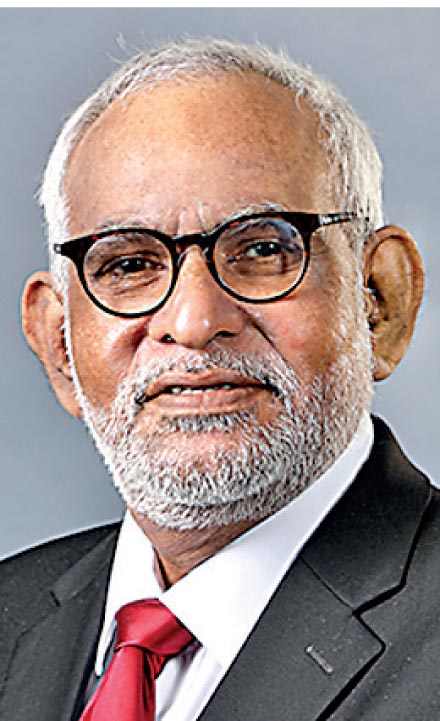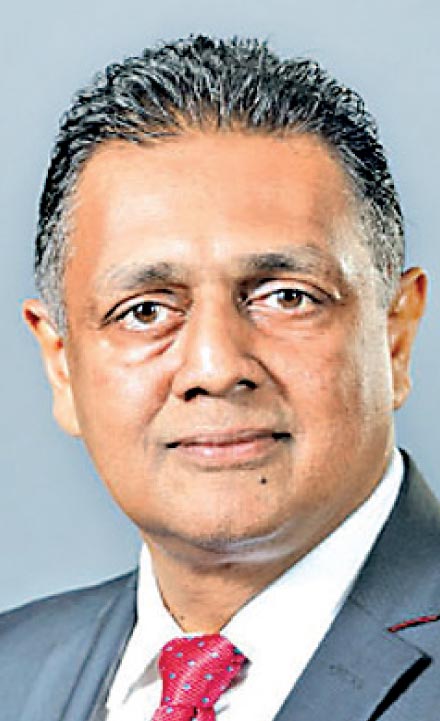Tuesday Feb 17, 2026
Tuesday Feb 17, 2026
Thursday, 9 May 2024 03:16 - - {{hitsCtrl.values.hits}}

Chairman J. Durairatnam

Director CEO Thimal Perera
DFCC Bank said yesterday it demonstrated resilience and continued its commitment to serving customers nationwide, delivering high-quality customer centric banking services amidst the ongoing revival of economic activity.
Director/Chief Executive Officer Thimal Perera said, “DFCC Bank has delivered strong financial performance, with profits surging alongside the ongoing economic revival. Our Group Net Operating Income increased by 48% to Rs. 9.6 billion, while the impairment charge significantly dropped by 66% to Rs. 1.6 billion, reflecting the positive changes in the economic landscape. The Group’s Profit After Tax rose by 85% to Rs. 3.8 billion, highlighting our resilient and strategic approach. Despite lower interest margins, our proactive measures in cost control and risk management have sustained our profitability. DFCC Bank remains committed to offering exceptional customer-centric banking services, as we strive to support and drive economic growth across the nation.”
In a statement the Bank said proactive policy adjustments facilitated a notable reduction in historically high-interest rates aimed at bolstering economic growth and stabilising inflation. This initiative, which started in June 2023, envisaged a substantial and widespread decrease in lending rates across markets, aligning with the overarching goal of monetary easing. Complementing this effort, DFCC Bank promptly aligned with directives, swiftly reducing lending and deposit rates to ensure the effective transmission of monetary policy benefits to businesses and individuals.
The Net Interest Income (NII) in the first quarter of 2024 was significantly impacted by the Bank’s decision to lower interest rates. However, the well-executed business strategies, increased prudence, and proactive risk management measures helped manage the Bank’s profitability. With the changes in interest rates, the Bank has disposed part of government securities classified as FVOCI to realise a gain of Rs. 1.9 billion and the notable reduction in impairment as a result of the positive developments in the macroeconomic environment and recovery efforts made by the Bank enabled the Bank to maintain profitability whilst providing much needed concessions to our valued customers during these challenging times.
DFCC Bank PLC, the largest entity within the Group, reported a Profit Before Tax (PBT) of Rs. 4,733 million and a Profit After Tax (PAT) of Rs. 3,134 million for the period ended 31 March 2024 compared with the previous period’s PBT of Rs. 2,684 million and a PAT of Rs. 1,749 million. The Group recorded a PBT of Rs. 5,455 million and PAT of Rs. 3,824 million for the period ended 31 March 2024 as compared to Rs. 3,001 million and Rs. 2,062 million, respectively, in 2023. The Bank’s Return on Equity (ROE) improved to 10.82% during the period ended 31 March 2024 from 12.19% recorded for the year ended 31 December 2023. The Bank’s Return on Assets (ROA) before tax for the period ended 31 March 2024 is 1.85% compared to 1.82% for the year ended 31 December 2023. The Bank’s total tax expense, which includes Value Added Tax (VAT) and Social Security Contribution Levy (SSCL) on financial services and Income Tax, is Rs. 2,886 million for the period ending 31 March 2024. As a result, the Bank’s tax expense as a percentage of operating profit for the period stood at 47.94%.
Along with the improvement in liquidity conditions of the domestic money market in line with the relaxed monetary policy stance of the Central Bank, both deposit and lending interest rates have continued to adjust downwards since June 2023. The Central Bank of Sri Lanka underscored the need for a swift and complete pass-through of monetary easing measures to market interest rates, particularly lending rates, by the financial institutions, thereby accelerating the normalisation of market interest rates in the period ahead. Accordingly, the Bank has recorded notable downward adjustments to lending and deposit rates to align with the monetary directions to ease monetary conditions for individuals and businesses adequately and swiftly, thereby supporting the envisaged rebound of the economy. The lower interest rates have resulted in reduced interest income and expenses compared to 1Q 2023. In addition to that, the prevailing accommodative monetary policy stance, along with the reduction of policy interest rates, is expected to induce a further reduction in market lending rates and encourage the expansion of credit to the private sector, thus supporting the ongoing revival of economic activity, in the period ahead.
The Bank’s Net Interest Income (NII), which is its core business, decreased by 16% to reach Rs. 7,038 million by the quarter end of March 2024. The interest margin decreased from 5.18% in December 2023 to 4.48% by March 2024.
With the tariff reduction for remittances, fee income has reduced compared to Q1 2023, even though the Bank has increased volumes. Along with the change in the business environment, the Bank increased the commission from credit card operations by increasing volumes. However, expenses related to credit card operations were also increased resulting in reduced net fee and commission income. Accordingly, net fee and commission income have decreased by 8% to Rs. 975 million for the period ended 31 March 2024, compared to Rs. 1,064 million for the comparative period in 2023.
The impaired loan (stage 3) ratio decreased from 7.03% in December 2023 to 6.97% as of 31 March 2024 with the positive developments in the macroeconomic environment coupled with the Bank’s concerted efforts in recoveries. To address the current and potential future impacts of the present economic conditions on the lending portfolio, the Bank made adequate impairment provisions during the period by continuing to calibrate internal models to account for unseen risk factors in the future, including additional provisions made for the Bank’s exposure to risk elevated sectors.
The Bank has used significant judgment using the information available at the reporting date to estimate the recoverable value of foreign currency-denominated investment securities issued by the Government of Sri Lanka. Accordingly, an impairment charge has been recognised to maintain a provision cover of 55% on the above investments.
Accordingly, reflecting positive macroeconomic indicators and recoveries, the impairment charges improved to Rs. 1,585 million for the period ended 31 March 2024, compared to Rs. 4,691 million in the comparable period.
Operating expenses for the period ended 31 March 2024 increased to Rs. 3,439 million compared with Rs. 2,837 million during the corresponding period in 2023, primarily due to the increase in inflation. However, the Bank has taken numerous cost control measures, resulting in operating expenses being curtailed and managed at these levels. The Bank’s cost/net income ratio has increased to 38.90% as at period ended 31 March 2024 compared to 29.41% as at 31 December 2023 due to a reduction in interest margin and an increase in staff cost during the period.
Changes in the fair value of investments in equity securities and fixed-income securities (treasury bills and bonds) and movement in hedging reserves are recorded through other comprehensive income. Due to the application of hedge accounting, the impact on the Bank’s total equity due to exchange rate fluctuation was minimised. A fair value gain of Rs. 529 million was recorded on account of equity securities outstanding as at 31 March 2024. The increase in the share price of Commercial Bank of Ceylon PLC during the period was the main contributor to the reported fair value gain in equity securities. The favourable movement in treasury bills and bond yields also resulted in a fair value gain of Rs. 1,473 million.
The DFCC Bank’s total assets decreased by Rs. 21 billion, recording a decline of 3% from December 2023, mainly due to the strategic decision taken by the Bank to repay part of liabilities due to banks with high cost and appreciation of the Sri Lanka Rupee compared to 31 December 2023. With the revival of economic activity and reduced lending interest rates, the net loan portfolio has recorded Rs. 355 billion as at 31 March 2024, which is a 2% growth compared with the balance as at 31 December 2023.
The DFCC Bank’s total liabilities decreased by Rs. 22 billion, recording a decline of 4% from December 2023, mainly due to the strategic decision taken by the Bank to repay some high-cost short term borrowings compared to 31 December 2023. Further, the Bank’s deposit base experienced a growth of 7% during the year, recording an increase of Rs. 29 billion to Rs. 436 billion, up from Rs. 407 billion as at 31 December 2023. This resulted in recording an improved loan-to-deposit ratio of 92.22%. Further, the CASA ratio was 23.25% as at 31 March 2024. The Bank’s funding costs were also contained using medium to long-term concessionary credit lines, primarily used to grow the lending portfolio and provide much needed concessionary funding to our customers. Considering these concessionary term borrowings, the CASA ratio improved to 31.79%, and the loans-to-deposit ratio improved to 81.96% as at 31 March 2024.
DFCC Bank’s total equity increased to Rs. 68.3 billion as at 31 March 2024, supported by favourable movements in the equity portfolio and fixed income security portfolio classified as fair value through other comprehensive income, and positive movements in the hedging reserve, together with the recorded profit after tax of Rs. 3.1 billion. Accordingly, Tier 1 and Total Capital ratios were recorded at 10.391% and 14.164% by 31 March 2024, compared to 11.490% and 13.511%, respectively, as at 31 December 2023. The Bank’s Net Stable Funding Ratio (NSFR) was 147.86%, and Liquidity Coverage Ratio (LCR) – all currency – was 286.63% as at 31 March 2024, compared to 124.60% and 597.47%, respectively, as at 31 December 2023. All these ratios were thus maintained well above the minimum regulatory requirement.